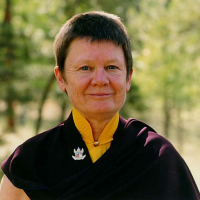The traditional aspiration used is ‘May I and others enjoy happiness and the root of happiness.’ In teaching this I’ve found that people sometimes have trouble with the word happiness. They say things like, ‘Suffering has taught me a lot and happiness gets me in trouble.’ They aren’t sure that happiness is what they wish for themselves or others. This may be because our conventional notion of happiness is far too limited. To get at the heart of the loving-kindness practice we may have to put the aspiration for happiness into our own words. One man told me of his aspiration that he and others realize their fullest potential. The aspiration of a woman I know is that we all learn to speak and think and act in a way that adds up to fundamental well-being. The aspiration of another person is that all beings – including himself – begin to trust in their basic goodness. It is important that each of us make the aspiration as genuine as possible.

Pema Chödron
from the book The Places That Scare You: A Guide to Fearlessness in Difficult Times
Read a random quote or see all quotes by Pema Chödron.
Further quotes from the book The Places That Scare You:
- Our true nature and condition
- Nothing and no one is fixed
- Whatever we encounter
- Being inspired by everyday good fortune
- The queasy feeling of being in the middle of nowhere
- The anxiety of opening
- Everyday uncertainty
- Cultivating equanimity
- Life preferences
- The root of happiness
- Awakening our unlimited potential
- Dissolving our self-importance
- Dissolving our fear
- At least until you die
- The first mark of existence
- Being in the middle of nowhere
- A flexible identity
- Our Shared Humanity
- Idiot Compassion